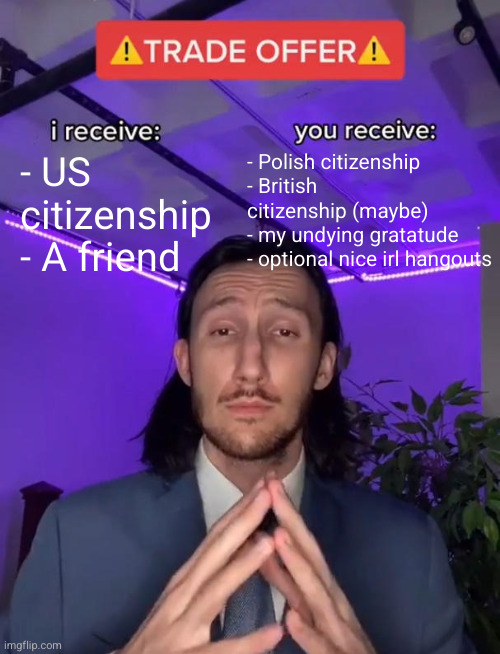Preferably into the EU. I speak some Spanish and I’m set to graduate with an Associates this semester. Hoping to get CompTIA certs sometime soonish and would like to continue schooling to get a bachelor’s in Compsci. Most notable work experience is 2 years in an office setting making collection calls and processing payments. What resources are available to me? Who or what agency/department can I contact to get more information? What’s the pipeline look like?
I know I could look most of this up, but there’s a lot of information out there and some(a lot) of it I find somewhat confusing. Plus, I don’t really even know where to start.
Step 1, figure out if any of your parents, grandparents, or in some cases great grandparents came from somewhere else. Many countries allow near descendents to get citizenship.
and that’s the true story of how my partner and i figured out that the only non US place that will take us is ruzzia
And that’s the true story of how I learned all my Polish ancestors came over before modern Poland was a thing, and thus didn’t have Polish citizenship to pass on.
broooo! same! the weird part is that the part of so called russian poland my family was from when they evacuated Europe is in Western Ukraine now, so i guess the conclusion is everything’s made up and nationalities don’t matter
Similarly fuzzy! I think they mostly came from the “Kingdom of Galicia and Lodomeria” region of Poland. Some definitely have “Galicia” on their earlier census records, then later records for the same relatives say Poland. Other relatives waffle between Poland and Russia. t National borders are so fuzzy.
The other side of the family is from Appalachia since the 1800s, but sometimes can’t decide if they’re born in TN or KY because they were from a disputed region.
there are dozens of us with this background! dozens!
Country borders are just lines on a map. They don’t exist in the real world.
If only everyone was able to experience the overview effect, a lot of our issues could potentially fix themselves.
Mine did, too. I received Polish citizenship this year. If your family came from what is today Poland and you can prove that, you’re potentially eligible. If not, and they came from the territory that is today Hungary, Romania, etc - then check with those countries instead as similar laws apply.
That is a rough one, damn
our partner now
Free benefits
Oof
Well that’s not really an improvement…
lateral move at best. marked step down most likely
Step 1, figure out if any of your parents, grandparents…came from somewhere else.
I’m related to 7 different passengers of the Mayflower!
…yup I’m not moving countries the easy way
Oh damn maybe we’re related. Wing?
I’ll have to have my dad explain it again because he’s the one who’s really been deep diving into genealogy, but I remember he said the captain of the ship and the guy that fell overboard were two of the people we’re related to
For great grandparents I go through 23 and me or other similar service, right? I know the grandparents on my mother’s side are Venezuelan and the ones on my father’s side are from the US, I don’t know about further back than that.
23 and me is a private company that sells your data and gives you a piece of paper with some percentage points written on it.
Unless your relatives are still alive and have another country’s citizenship along with the papers to prove it, you’re out of luck.If you have Italian ancestry, they actually have government help that will do free reviews of US immigration documents. I missed my Italian citizenship by a few years :(
But it was super easy to find out. Just google around for it, jure sanguinis or something like that.
What? Can’t you just ask your mom who her grandparents were?
Although as I type this I realize I have no idea if your parents are still alive, or on speaking terms.
lol all good, she is alive, and we are on speaking terms (I see her a few times a week). I’ll ask her, but I’m pretty certain her grandparents are native to Venezuela too. I don’t know if she really knows them or if they’re still alive though…
lol all good, she is alive, and we are on speaking terms (I see her a few times a week). I’ll ask her, but I’m pretty certain her grandparents are native to Venezuela too. I don’t know if she really knows them or if they’re still alive though…
I may have to look into this. My grandparents on my father’s side moved here from Norway as children (separate families obviously but immigrated around the same time to the same place, Minnesota) I’d love to go to Norway, I even know a (very) little Norwegian.
Semi serious. Who said it is gay to marry your homies?

Not OP, where do I apply
Seconded
Look up digital nomad visas. Get remote work here, then apply to relocate to EU country. Good luck with the timezone difference, tho.
Getting remote work with my current level of education and experience seems almost impossible. I’ve looked on Remotists.com and Indeed, all the ones I saw ask for a bachelor’s minimum or very high skill set that I simply don’t have yet. Do you have any recommendations on where to look for remote jobs I might qualify for?
You might be able to find one with state/federal government - but they might have rules about residing within the state you’re at. Or require you to come in occasionally. But they can be good places to get started in a career. www.governmentjobs.com or usajobs.gov Not sure about private.
A couple of months ago I had a recruiter from the Department of State hit me up on Linkedin about onsite technical support roles at their embassies. The location selection process sounded more like military deployment and really sounded like a lot more uncertainty than I’d want to put my family through but if I didn’t have kids I’d have absolutely pursued it just for the experience. They were hiring for a ton of open positions so those might still be open if you have an IT background
I recently lost my mostly-remote role to layoffs and struggled to even land an interview, and ended up accepting a fully in person role an hour’s drive away. Job market’s pretty tight right now.
From the analysis I heard on the economics podcast I listen to, people aren’t changing jobs much and employers aren’t listing new jobs much at this second. Employers are apparently trying to wait and see what the new administration has in store for them before trying to expand their teams
deleted by creator
You think being an entrepreneur is more of a sure thing than finding an employer?
Being an entrepreneur in a new country with a different culture and set of laws
80% of startups fail as a benchmark. It’s pretty tricky to create a company.
*successfull company, incorporating is dead simple.
What do you mean by incorporating? I’m not super familiar with the term
Incorporating is just the legal paperwork that brings a corporation into existence. Never done it, but I bet it is just paperwork and money.
In the Netherlands it’s, no joke, 15 minutes and ~60 bucks.
Did it before, as a foreigner too, easiest shit in the world.
They even have dual language forms.
Huh, didn’t know that. It is pretty hard to start a business, but the process itself seems pretty straightforward. I’ll keep this in mind and look into it more, thank you.
Associates degrees are non-existent and not recognized in the EU, and most if not all countries require you to be a graduate to be eligible for hire, which would make a student visa the easiest route.
Luckily many countries offer tuition completely for free; though bachelor degrees are often taught in the native language. If your Spanish is solid, you could of course go to Spain, else with English you’d be somewhat restricted to Ireland and Malta (English is the second official language, but the primary for tuition).
Other than that, some universities have English taught bachelor degrees, so you’d have to research them individually. Finland is very English- and Tech-friendly, for starters.
I don’t think they offer free tuition to non-EU citizens
Nordic countries do
Germany does
While most German universities are tuition-free, foreign students will still have to prove they have the means to support themselves, which means a 5-figure sum for each year.
There are countries that do, but you’ll still need to demonstrate that you have the financial means to support yourself without working or needing recourse to public services for the duration of your study, so there’s still a fairly significant financial barrier to entry for most individuals. If you have the money to put down for 3 years of rent, food, utilities, etc, while you complete a degree in Europe, I imagine you’re generally doing pretty okay for yourself in the US.
In Germany “not free” means something like 400$ per semester at the public universities, doesn’t matter the nationality.
TIL: that’s not the case in the federal state of Baden Württemberg.
Wrong, correct answer is that it depends on the university.
But to be fair, the tuition is quite cheap depending on what and where you study. For myself the tuition is about 50€ per month(I just assume that the tuition is the same for non EU citizens).
50 euro tuitions are heavily subsidised, usually the price is a lot higher without subsidies.
deleted by creator
You still have to learn the language and take citizenship tests to become a citizen in many European countries
Same sex marriage is legal in the EU isnt true.
Basically nothing is “in the EU” There are some general laws that each country applies on their own (often treating them as suggestions and get fined if they dont respect them)
It’s legal in a lot of the EU though, especially if you stay out of eastern Europe
Are you able to spend a lot of money on it? Last I checked, there were a few places in the EU that had a citizenship track if you purchased substantial property. So if you’re in position to buy a nice house, that’s an option. I think Portugal is the most approachable cost-wise. But it’s been a while since I looked at this so I’m sure things have changed.
Several countries will allow extended student visas, even if you only speak English. I think Sweden allows this.
Then of course there’s the easy way: marry a Canadian.
You saying we’re easy? I mean… we are but you’re not supposed to just say it
Sorry
Did I pass the immigration test?
One of us!
I wonder how substantial they mean. I might be able to afford a down payment on something small, as long as the housing market is nothing like the one here in the States (ie significantly better). I’ll look into it, thanks.
Sorry, it looks like the real estate option in Portugal is no longer available. :( Now it would take a €500K investment in a local business or €250K in a nonprofit. If you’re that stinkin’ rich, you probably have better options already.
According to https://www.globalcitizensolutions.com/real-estate-citizenship/ , Cyprus offers a citizenship path with real estate purchase of €300K. Greece and some other countries do, as well.
Getting a student visa is easy and an excellent way to both get valid credentials and a feel for the local culture.
As to where you should go depends on what you’re interested in, you’ll almost certainly be able to make a home wherever, so pick something that seems interesting and go (you can always use your mandated vacation days to explore the rest of EU).
For language, in almost all the major cities people will be able to speak English, although typically you’ll want to learn the local language sooner rather than later for social reasons.
If you know Spanish go Barcelona, beautiful city, vibrant in both culture and industry, and with values not too shockingly different to the US. For more info, either visit the Spanish consulate nearest you or look up their online presence.
If you want to keep to English, consider Ireland, they’ve also had a booming IT industry for all the giants needing a foot in the EU.
Mostly you can’t go wrong anywhere in the EU. Biggest culture shock would probably be the Nordics or Slavic countries, but not necessarily in a bad way.
All of them have tons of info about student visas at each university, the degrees are standardised throughout the EU and most universities are good, and typically outstanding in a couple areas.
For more info you just contact their international coordinator, or their closest consulate.Most countries also have dedicated Web pages that outline the process, steps, and how you move toward permanent residence and citizenship if you’d want that.
Moving is typically the hard part, but if you start as a student, you’ll have a lot prepared for you (student accommodations, stipends, social activities, part-time job offers, recruitment fairs, incubators, etc.)
I second the student visa route. It doesn’t get you residency right away and is an expensive strategy, but it gets you out pretty quick. You also become more desirable since you have a higher education from a locally known institution. Currently doing this in New Zealand.
I had to look up what a consulate was lol. There’s a Spanish one in the biggest city in my state, 6 hours from me but they don’t have a website, I’ll have to call (or check Spain’s embassy website if they have one). Ireland doesn’t look like it has any consulates in the US, and the embassy is in Ireland itself… most likely will have to call them as well. Thanks!
Student exchange programs - > job - > permanent residence is one of the easiest ways to migrate.
Use European Grants for foreign Students and be debt free when you finish. … Even that should set you in front of your peers in the materialistic USA. ( No fees for studying and cost of living in less fancy european cities is really low for students).
This is what I would suggest.
Looking for grants and bursaries for the effort is something that should always happen. You may get lucky, or not, either way it will probably cost less than the same from an American university.
I mean, I haven’t done this, but it seems logical since OP is looking to further their education.
Get a working visa in AU’s or Canada, stretch it out and in the 5th year when the concentration camps and gas chambers are in full swing, there should be a refugee visa available.
Your best bet is through a company. If you have a reasonable job opportunity, familiarise yourself with the work visa and residency procedures. Your future employer will likely help you in the process.
However, the economy currently is tough also in the EU, so you’ll need to find a niche.
Job visa or student visa
I think the more difficult question will be … which country. Each EU country has specific laws and procedures. Although you can travel freely this doesn’t mean you can settle wherever you want.
Student visa is the most probable one I could get. The biggest issue is admissions, mainly because of language barriers. With Britain no longer in the EU, my next best bet is Spain because I already speak some Spanish, but I feel like it’s not enough to get accepted there.
Many universities in the EU have programs in English. I mean I personally believe that if you’re going to a foreign country you should learn the/a language spoken there, if only to not be frustrated by language barriers, but you don’t need to do that if your only goal is to get into university in a foreign country.
If money isn’t an issue or you could get financed somehow, a lot of European universities offer a pre-degree/pre-enrollment year to teach you their languages and prepare you for their entrance exam, you could get in this way
I did not know that was possibly a thing. I’ll check it out and see which ones offer that.
Netherlands and scandinavian countries have a lot of courses in english. And ireland of course. Also in germany slowly but steadily english courses are more offered. I would advise you to srudy in english because its hard to study in a foreign language even if you already speak it very good. However i also advise you to learn the local language to connect better to people and culture.
Mexico actually is a great country to live. Cheap living expenses, and the food is just ridonculously good. There are always good jobs available for educated people with good English
Out of curiosity, what is the climate/temperature like there, in the big cities? I imagine it being very warm
Biggest swamp cooler in the world just off the west coast. The closer you get to the Pacific, the more moderate the temperature is. It’s rather cool in Tijuana, currently. (50° F/ 10.5° C)
Depends in where you are. Mexico is (afaik, I might be wrong) the only country that has every possible climat in the world within its borders.
You can have sweaty hot, but tolerable, in Vallarta, you can have dry hot but very doable.innthe Guanajuato region, you can have a milder climate in Mexico City
EU is not a single country, as the US. Each country has its own rules and regulations.
Some countries, as mentioned, offer a digital nomad visa (Croatia is one of them) others do not.
There’s also something called the Shengen area, which allows for free movement between countries. Not all EU counties participate (yet) and even some non-EU countries are part of it. This allows you to have a citizenship in one country and live / work in another.
As for the language, your mileage can vary. Most countries will require at least a basic language knowlege to pass the citizenship test. For day-to-day communication, work and study, you can find options where English would be sufficient. Lots of universities offer English-language programs and lost of companies are international with English being the primary language. Most Europeans speak English quite well.
As others have mentioned, a student visa for one of these would be your best bet. Explore which country would make most sense based on your needs.
If student visa is not an option, then getting a job (in the target country) first would be a way in. Get a working visa and start applying for citizenship.
You should also understand that literary everybody in Europe (not just EU) has an ID and is registered as a citizen. It’s therefore practically impossible to be undocumented and still get salary, open a bank account or visit a doctor.
TL;DR: Explore each country individually. “Moving to EU” makes as much sense as saying “Moving to Asia”.
So you’re saying this was a stupid question?
There are no stupid questions. I sincerely did not understand it as such. If you don’t know something, ask. If you have no idea where to start, ask. And this is how I understood it.
You could do your bachelor’s in the EU. In that case, I believe the easiest way is by searching for universities that offer studies in english. The university I work at offers a master’s in computer science in English but the bachelor’s is in German. Most international universities also have offices that can help you with organizing your stay and visa.

















